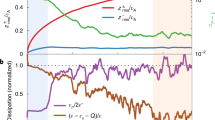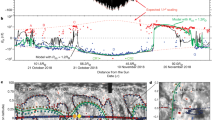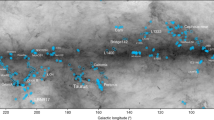Abstract
THE important discovery by Prof. Hale of the Zeeman effect in sun-spot spectra proves the presence of extensive areas on the solar surface in which ions of one kind largely preponderate. This suggests the solution of one great difficulty which has blocked the way in the attempts that have been made to explain the very high velocities which are not unfrequently observed near the solar surface by spectroscopic and other means. For there is a limit to the velocity of a gas impelled by pressure only, this being the velocity with which it streams from a high pressure into a vacuum, and we may put this limiting velocity to be equal to that of propagation of sound in the gas. Observation shows that the highest velocities observed on the solar surface are about 200 times as great as the velocity of sound in hydrogen at the temperature of freezing water.
This is a preview of subscription content, access via your institution
Access options
Subscribe to this journal
Receive 51 print issues and online access
$199.00 per year
only $3.90 per issue
Buy this article
- Purchase on Springer Link
- Instant access to full article PDF
Prices may be subject to local taxes which are calculated during checkout
Similar content being viewed by others
Author information
Authors and Affiliations
Rights and permissions
About this article
Cite this article
SCHUSTER, A. A Suggested Explanation of the High Velocities of Gases observed on the Solar Surface. Nature 78, 662–663 (1908). https://doi.org/10.1038/078662d0
Issue Date:
DOI: https://doi.org/10.1038/078662d0
Comments
By submitting a comment you agree to abide by our Terms and Community Guidelines. If you find something abusive or that does not comply with our terms or guidelines please flag it as inappropriate.



